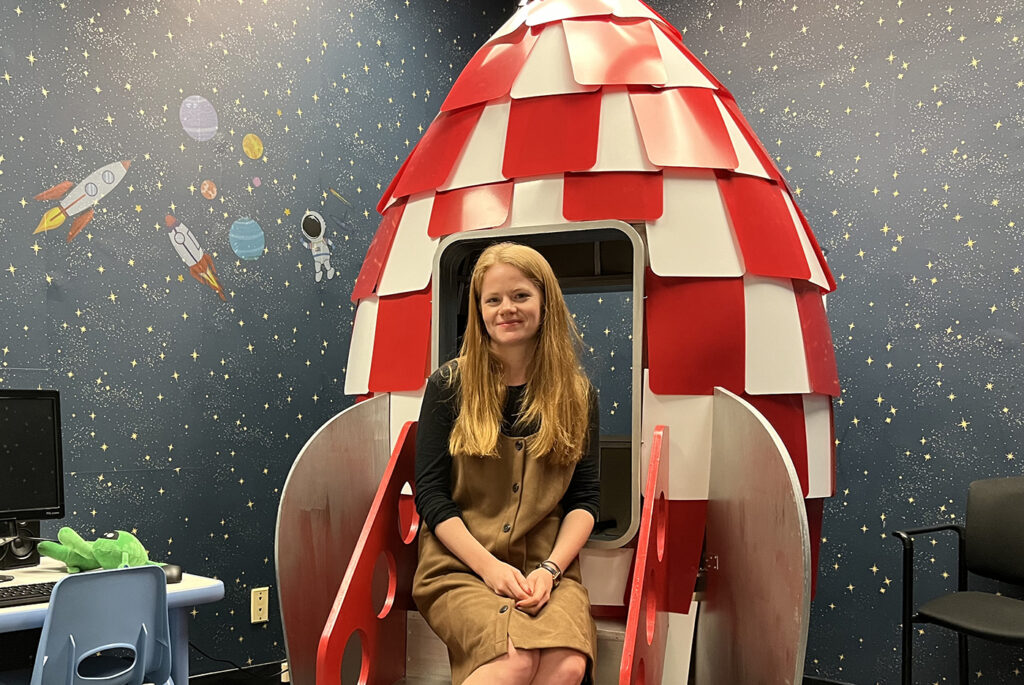Meg Cychosz is expanding the universe of language development research

Marta Wallien/UCLA Humanities
Meg Cychosz and her team evaluate children’s language processing using a space-themed video game, with subjects seated inside a model rocket ship.
| January 23, 2025
As the leader of UCLA’s Speech and Cognitive Development Lab, Meg Cychosz studies how children from a wide range of backgrounds learn speech and language from their environments.
Cychosz (pronounced SEE-kosh) established the lab in 2023, when she arrived at UCLA as an assistant professor of linguistics. But the seeds for her current work were planted in the late 2010s, when she was working toward her doctorate at UC Berkeley.
Cychosz noticed a gap in the existing research on how children learn language: While there was a wealth of scholarship on children in Western societies, there was a lack of comparable research on children from different cultural backgrounds.
A key difference, Cychosz knew, is that children in Western societies gain much of their language learning through adults speaking directly to them, while children in other cultures are more likely to pick up language from overheard speech — conversations they hear around them but that aren’t necessarily directed to them — and largely from other children. She wondered how those differences influence language acquisition among the millions of children raised outside of areas where directed speech is the norm.
Such questions have animated Cychosz’s research ever since — during extended visits to Bolivia, where she studied how children in Quechan indigenous groups learn speech from their parents; in her postdoctoral work at the University of Maryland, where she studied language acquisition in children with hearing loss; and more recently as a research associate at UC San Francisco.
Now at UCLA, Cychosz studies language development among multilingual children, children with typical hearing, and children with hearing loss who have cochlear implants. The research involving children with cochlear implants — electronic devices embedded in the skull behind the wearer’s ear to stimulate the auditory nerve — could have important practical applications, because the devices are often implanted when children are young, at a time when the brain would ordinarily be building language development capability.
Cochlear implants are not magic-bullet solutions. The sound they produce is analogous to “listening to a robot,” Cychosz said. And helping children with the implants learn language is still a challenge, requiring significant time and effort from parents or caregivers, and regular visits to speech therapists. For children who receive cochlear implants, timing is a critical consideration.
“The formation of neural pathways happens within the first couple years of life,” Cychosz said. “If the auditory nerve isn’t stimulated from spoken language coming in from caregivers, it will develop differently. So if you want the child to develop spoken language, you have to get that part of the brain stimulated when they are young. The brain becomes less plastic over time, so you don’t want to wait until the child is 4 years old, because spoken language will be that much harder for the child.”
To evaluate language processing in children with cochlear implants, Cychosz and her team use a space-themed game. Subjects sit in a model rocket ship and are asked to find different images — an alien or a dog, for example — on a video screen. Researchers track their eye movements and compare the results to those of children with typical hearing. The rate at which subjects can distinguish between different objects predicts how quickly their language is developing, Cychosz said.
“This research addresses spoken language development,” she said, “but many children develop complete language capabilities through sign language as well as, or instead of, using cochlear implants.”
It’s a unique approach, said Cychosz’s colleague Jessica Rett, a UCLA professor of linguistics.
“She’s doing her research from an incredibly creative angle, by looking at how children with hearing loss perceive language after receiving cochlear implants,” Rett said. “And it allows her to study the subject in different ways than scientists typically do. Just as importantly, it allows her to get involved with a community of kids with disabilities and their families.”
For example, Cychosz gives talks to parents of children with cochlear implants, sharing strategies for how to help kids learn spoken language.
“She is a great asset to UCLA and to the Los Angeles community,” Rett said.
Cychosz said that when she began studying children with hearing loss during her time at Maryland, she didn’t even know the difference between a hearing aid and a cochlear implant; she just knew she loved collecting data and working with children.
“I knew I could handle adding another population to my research program and I thought it would be really important to work with kids who have some kind of communication difficulty,” she said.
Now, just four years later, the research she’s conducting could go a long way toward empowering parents to help their children develop language skills.
